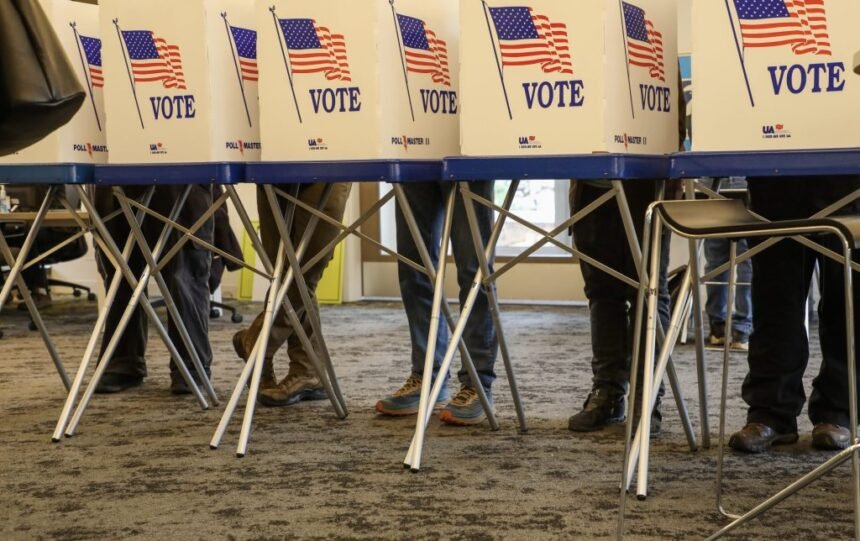Chris Dillmann/Vail Daily
As voters across the country swung toward former President Donald Trump on Tuesday, Colorado’s Latino electorate bucked the national trend, according to a statewide exit poll.
The poll surveyed 600 registered Latino voters who had cast a ballot in the 2024 General Election up to and including on Election Day. BSP Research conducted the poll in partnership with leading statewide Latino advocacy groups Voces Unidas and the Colorado Organization for Latina Opportunity and Reproductive Rights.
The results showed strong support for Democratic candidates, including Vice President Kamala Harris, who ultimately lost the 2024 election amid a national rightward shift among voters — including Latinos in key battleground states.
Latino voters make up 17% of the electorate in Colorado. Voters were oversampled in congressional districts 1, 2 and 3 — which have the largest Latino populations. The findings were presented Wednesday during a virtual media briefing.
In the presidential race, 67% of surveyed Latinos said they voted for Harris compared to 30% who voted for Trump. Harris’s support in Colorado was roughly 4 percentage points higher than what the polling firm saw in its national survey, according to Gabriel Sanchez, director of research for BSP.

Support Local Journalism
“That helped Harris secure obviously Colorado’s electoral votes — a bright spot in an overall pretty big night for Republicans across the country,” Sanchez said.
Some exit polls showed Trump making historic gains with Latino voters. A survey from Edison Research showed Latino support for Trump increased 14 points from 2020. His share of the national Latino electorate was the highest for a Republican presidential candidate in exit polls in around 50 years, according to the American Enterprise Institute, a conservative think tank.
“In this overall election climate where I’m sure you all are already seeing a lot of stories talking about Latinos moving towards Trump across the nation … it’s important to emphasize that was not the story in the state of Colorado,” Sanchez said.
In particular, national trends have pointed to a shift toward Trump among Latino men. The BSP poll found that, in Colorado, Latino men supported Trump by around 5 percentage points more than Latina women. A majority of both men and women still supported Harris.
Compared to national exit poll data, “You see that here in Colorado, there is a meaningful but relatively small gap between Latinas and Latino males,” Sanchez said.
For congressional races, 63% of Latino voters said they supported a Democratic candidate. In Congressional District 3 — which includes much of the Western Slope and parts of the southern plains — 62% voted for Democratic candidate Adam Frisch. A former Aspen city councilmember, Frisch lost the race to Grand Junction Republican Jeff Hurd.
Most voters said their No. 1 issue was the cost of living and inflation, something the research firm also found in its fall survey of Latino voters ahead of the election. Across the country, the economy was a dominant concern for voters.
While nationally Republicans performed better among voters whose top issues were economic, Democrats in Colorado maintained an advantage on the issue with most Latino voters, the exit poll shows.

Among other key issues, Latino Harris supporters in Colorado were more likely to prioritize expanding and protecting abortion rights while Trump supporters were more likely to prioritize increasing border security and limiting migration.
Overall, 68% of Latino voters said they supported enshrining abortion access in the Colorado Constitution, a measure that passed with over 61% of state voters in support.
Sanchez said that could have played a role in Latino voters’ outsized support for Harris.
“When you look at attitudes towards abortion between Latino men and women nationally, that gap is significantly wider than it is among Latinos in Colorado,” Sanchez said. “So I think — where maybe in some other states — the Democrats leading with reproductive health might not have played as well with Latino males.”
Latino voters strongly supported Amendment 80, the school choice ballot measure, with 67% in favor. Fifty-seven percent said they voted for Proposition 131, which would have instituted ranked-choice voting and all-candidate primaries in certain state elections. Both measures failed.
Most voters also supported — by narrower margins — ballot questions seeking to protect gay marriage in the state Constitution, to impose a tax on the sale of firearms and to provide $350 million in additional state funding for law enforcement. All three passed.
The survey is the latest in a four-year polling effort by Latino advocacy groups to gain better insight into their communities’ voting patterns and priorities amid a lack of state data.
Colorado does not record voters’ race or ethnicity, and polling from other national groups can oftentimes treat Latinos as a monolith — focusing more on population centers and ignoring rural areas, said Voces Unidas President Alex Sanchez.
“I think our research is probably trying to get away from treating Latinos all the same,” he said. “While no polling and no research initiative will be perfect, this is the start of something in Colorado that has never been done.”











